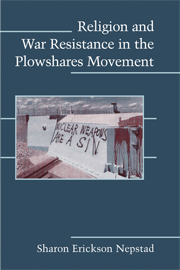Book contents
- Frontmatter
- Contents
- List of Tables and Figures
- Preface
- Acknowledgments
- Religion and War Resistance in the Plowshares Movement
- INTRODUCTION: MOVEMENT CHALLENGES AND TRAJECTORIES
- Part I The U.S. Plowshares Movement
- Part II The International Plowshares Movements
- 8 CONCLUSION: FROM FAILED ATTEMPTS TO PERSISTENT RESISTANCE – UNDERSTANDING DIVERGENT MOVEMENT TRAJECTORIES
- Appendix A Survey Questionnaire
- Appendix B List of Interviews by Author
- Appendix C Chronological List of Plowshares Actions by Region
- Bibliography
- Index
8 - CONCLUSION: FROM FAILED ATTEMPTS TO PERSISTENT RESISTANCE – UNDERSTANDING DIVERGENT MOVEMENT TRAJECTORIES
Published online by Cambridge University Press: 05 September 2012
- Frontmatter
- Contents
- List of Tables and Figures
- Preface
- Acknowledgments
- Religion and War Resistance in the Plowshares Movement
- INTRODUCTION: MOVEMENT CHALLENGES AND TRAJECTORIES
- Part I The U.S. Plowshares Movement
- Part II The International Plowshares Movements
- 8 CONCLUSION: FROM FAILED ATTEMPTS TO PERSISTENT RESISTANCE – UNDERSTANDING DIVERGENT MOVEMENT TRAJECTORIES
- Appendix A Survey Questionnaire
- Appendix B List of Interviews by Author
- Appendix C Chronological List of Plowshares Actions by Region
- Bibliography
- Index
Summary
Since 1980, Plowshares activists throughout the world have been breaking into military bases and weapons production sites to call for disarmament and the abolition of war. During this time, the world has changed dramatically. The first Plowshares action at General Electric occurred when the arms race was escalating and the rapid proliferation of nuclear weapons generated great public concern. Then the Berlin Wall fell, the Soviet Union collapsed, and the Cold War ended. Political leaders were signing disarmament agreements and peace appeared to be breaking out all over. The sense of international tranquility did not last long, however, as the al Qaeda attacks on September 11, 2001 – along with subsequent terrorist acts and the ensuing U.S. wars in Afghanistan and Iraq – created a new set of hostile geopolitical dynamics. Bellicose attitudes and heightened security concerns constituted another shift in the political environment at the start of the twenty-first century.
Remarkably, these changing circumstances and fluctuating political conditions have not had a strong influence on the trajectories of the Plowshares movement. Its activists have organized under a variety of conditions – some favorable, some not. The U.S. movement has faced significant repression but has persisted steadily for decades, continuously drawing attention to the fact that nuclear weapons still exist and pose a threat to all humanity. Some of the international branches, such as the British, Dutch, and Swedish Plowshares movements, began mobilization efforts in the late 1980s and early 1990s when most other peace movements were on the decline due to the lack of political opportunities and the perceived belief that nuclear weapons were no longer a serious concern.
- Type
- Chapter
- Information
- Religion and War Resistance in the Plowshares Movement , pp. 203 - 222Publisher: Cambridge University PressPrint publication year: 2008



